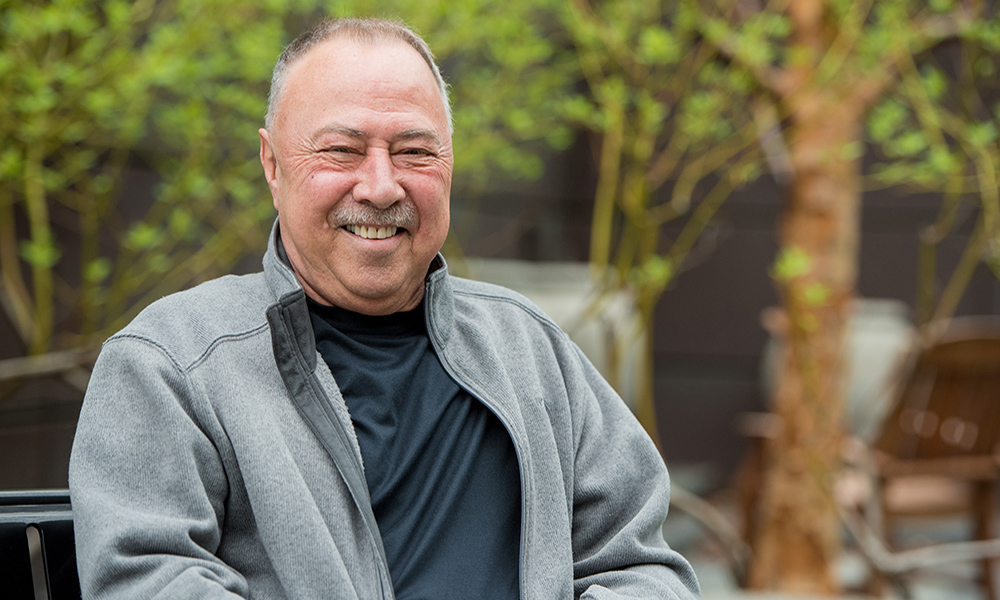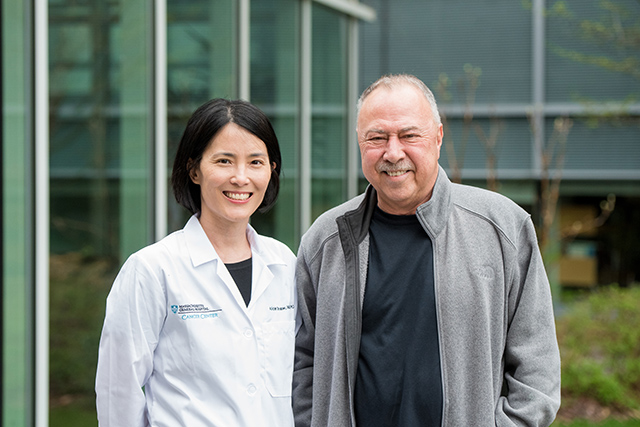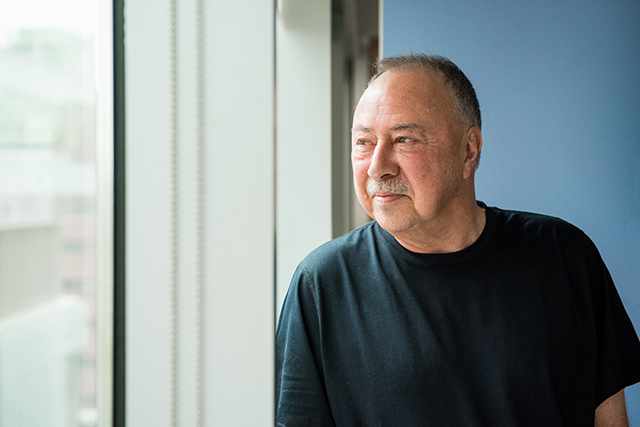Patient StoryJun | 7 | 2019
Jerry Remy


The Cancer Center’s Story Project is an effort to capture stories from our community of patients, friends, family, clinicians, and staff who have been affected by cancer in some way. This is Jerry's Story.
- A lifelong Massachusetts resident, Jerry knew coming to the Mass General Cancer Center was putting his care in the best hands possible.
- "Cancer has opened up a whole new door to something I was never open with in the past - sharing my personal life."
How has your diagnosis changed your outlook on life?

"Well, it changed incredibly. The scariest word for me was cancer. Then all of a sudden I’m diagnosed with it. I was diagnosed through my primary care physician. I went to see him because I had a chest cold. He took a normal x-ray, and he didn't like something on the bottom of it. They decided I needed a CAT scan and that's when we found out it was cancer. The first time I had the cancer, it was removed by Dr. Wright through surgery. Then it just kept coming back, the same spot, the same area. I've had two surgeries, sessions of radiation, chemotherapy, and now immunotherapy."
You seem to have built good relationships with your team here.
"It’s great. Dr. Shaw is outstanding. She's always texting to find out how I'm feeling, how I'm doing. She's been right on top of things. I believe she's the one who got this [immunotherapy trial] going. My other option was to take out the right lung and hope that doing so would remove the cancer. There were a lot of risks to taking out my lung. My quality of life would not be the same. It was the toughest decision I had to make. I think the doctors agreed with me, so we opted for radiation. While I was doing the radiation, Dr. Shaw was working on this treatment, and once we got the go-ahead, I started on this immunotherapy treatment."
Clinical trials are important to the treatment discovery process. How has your experience with this trial been?
"It’s been working for me. I've been in for CAT scans a number of times since I started and there's been no new tumor growth. I hope it’s successful for a few reasons. I really hope that if it's doing something for me that proves to be good, that it can help other people. I mean, most people have been through the other phases that I've been through: the chemo, radiation, surgeries, but a lot haven't been through what I'm going through now. For me and for patients in the future, I hope it gets the job done."

How has your diagnosis changed the way you think about your career?
"When you get diagnosed with cancer, it makes you think. All of a sudden everything's not rosy like it once was. But you learn to live with it, and I've learned to live with what I've got. I've adjusted my work schedule, I'm not as busy as I used to be. It also gives me a platform to connect with people. I’m on the TV, I do articles, and tell my story; I talk about what I’ve been going through. I think it's helping others. They see somebody they know well who's going through this. I can’t even answer all of the cards and letters I get from people wishing me well. People tell me their stories. It’s opened up a whole new door to something I was never open with in the past - sharing my personal life. I think the reason I do now is because by doing that, I can let people know that I'm a human being just like them, I have the same problems they have, and that we all feel like we have something in common."
If you could offer advice to others out there, or to your younger self, what would that be?
"If I can help just one person…my biggest piece of advice would be to get people to visit the doctor. I was never one to do that, but just by going that one time I was sick, that’s how they diagnosed me. Had I neglected to go, who knows? It may have been too late. My advice is to try to get people to see their doctors for their normal checkups and, hopefully, if you get something like this, you get it early enough where it can be taken care of."
"There's no question I'm laying here today because of cigarettes. I'm not one to go out and preach to people who smoke and say, 'You better stop that.' They know what they're doing. The information is out there now. It wasn't quite like that when I was a kid growing up. My parents smoked but they both quit."
"I wish I didn't smoke. I started smoking when I was 16 years old. My saying is, 'Don't pick up the first one because it's really tough to put down the last one.' I knew smoking wasn't good for you, but I was addicted. I never stopped, I never stopped. Even through my professional baseball career I continued to smoke as other athletes did. There's no doubt I'm here today because of that."
You have been open recently about your struggles with mental health. How did your cancer diagnosis affect that?
"I think I've always struggled with anxiety and depression, but it worsened when I was diagnosed. I think in part because it was keeping me from doing my job. I'm a workaholic and when I was recovering from surgery I was unable to do my job. That really knocked me out. It took me away from working for the first time ever. I went into a pretty deep depression. It wasn't so much the cancer, or the surgery, it was because it was keeping me from living my life. There's a lot of things you deal with emotionally when going through stuff like this. Anxiety, depression, I think, are a part of that. You’ve got to deal with that and get your life back on the right track. Since that time, I don't think I've had another episode of depression. Dr. Rosenbaum in psychiatry here took care of me. It’s all been here at Mass General. It's been incredible, the relationship that I've had with the doctors here and what they've done for me. Really, it’s amazing."
"It's a journey. It's another phase of your life. It can become consuming. It's a major part of your life and, quite frankly, I've come to accept it as living from CAT scan to CAT scan. If I go in and I get a clean CAT scan, I'm happy. If I don't, then we’ve got to figure out something to do about it. The more clean CAT scans I get, the happier I am."

How has it been going back to work?
"I missed so much time the last couple of years because of the cancer. I'm 66, and I've been traveling since I was 20 years old. I've been to all these places a million times. I go for two reasons. To have a good hotel room and to do my job, that's it. I don't sightsee. I don't do any of that. By cutting back on my schedule, it made it easier for [the radio station] to start thinking about somebody who may replace me someday. It also gives me more time to have treatments like this and not have to go to work tonight. Longevity-wise, I think it'll help me. If all this goes well, I think that I'll be able to do it a lot longer than I expected to. The schedule I was keeping was ridiculous. Doing 160 games a year with all the travel was crazy. But that's my job. Now I'm in a position where I've got some seniority. The station was very accommodating on how I wanted to do my schedule. We cut it back to about, probably between 80 and 90 games, as opposed to 161. It’s still a full schedule but it's good. It gives me time to look forward to and it also gives me time to be around enough to know that I'm not far removed from it."
I know when I walk into Fenway Park I feel that magic in the air, do you still feel that way?
"I grew up with it. I grew up in Somerset, Massachusetts, so I've always been a Red Sox fan. My grandparents, my father, and my mother used to take me up to the games as a kid. Then I got lucky enough to be able to play for them, and then to do this. It's like my second home. It really is a landmark. I feel blessed to be able to work in an atmosphere like that because I've seen all the ballparks around the country. There's only a handful that could compare. There's only one Fenway Park. To be able to have my whole career spent there has been very special. In our business if you go from job to job, you're moving all over the country. I've been able to be stable and stay home. I love Boston. I would never live anywhere else. People say, 'Well, you’ll get old and retire and go to Florida.' I'm not going to Florida."
"I can't imagine going through what I've gone through anywhere else, I really can't. Then to move away, say spend my winters in Florida, I’d still have to fly back and forth for appointments. I got more appointments than you could shake a stick at. I'm a New Englander, and I'll always be one."
Is there anything else you’d like to share?
"The only thing I would say is when they tell you something here, do it. The good thing about it is, I said we had a tough decision to make with the lung, taking it out. I looked around at all the doctors and I knew that if the decision was being made by me to remove the lung, my life would never be the same. I could sense that on their faces."
"Nobody would come out and say it, well, the surgeon did. But he said, 'I can do it…but...' When he said but, I said, 'I got to pay attention here.' I would recommend the whole 10 years that I've been going through this, if anybody had to go through it, I would recommend they do it with the exact same people because they've all been great. Everyone, every single one of them has been great."
Jerry RemyCancer has opened up a whole new door to something I was never open with in the past - sharing my personal life.
This interview was conducted April 22, 2019 and has been edited for clarity.
Related Programs
Type
Centers and Departments
Topics
Patient Stories
View inspiring cancer survivor stories from Mass General Brigham Cancer Institute’s community of patients, families, and staff.
We are home to more than 1,000 active clinical trials per year.
Ensuring that our patients have access to pioneering therapies.
